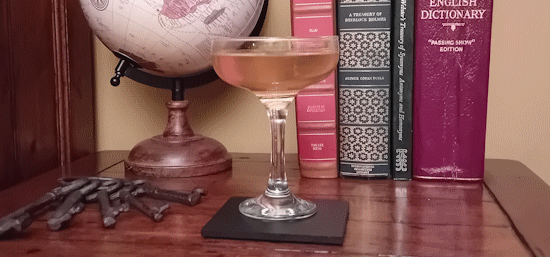Our third cocktail is the Merry Widow. The Merry Widow is a classic cocktail which first appeared in Hugo R. Ensslin’s Recipes for Mixed Drinks (2nd Edition) (1917); it takes it’s name from the Broadway production, The Merry Widow which opened in October 1907.

The Merry Widow is a classic cocktail which first appeared in Hugo R. Ensslin's Recipes for Mixed Drinks (2nd Edition) (1917); it takes it's name from the Broadway production, The Merry Widow which opened in October 2007.
Half-fill a mixing jug with ice.
Add all ingredients and stir until well-chilled.
Strain into a chilled cocktail coupe.
Place a twist of lemon peel on top.
AI generated anecdote for article length
The first true chill of autumn had arrived, and with it, the unmistakable scent of dried leaves and woodsmoke drifting through the neighborhood. Ben was hosting a small get-together in his warmly lit apartment, the perfect setting for an evening of drinks and laughter. Tonight, he wanted to serve something distinctive, a cocktail with an air of mystery that fit the autumn season and the conversations that often veered toward ghost stories and seasonal musings. After much deliberation, he had chosen the “Merry Widow.”
The Merry Widow was no ordinary cocktail—it was an enigmatic blend of flavors that carried a certain allure, balancing on the edge between elegance and intrigue. Made with London dry gin, dry vermouth, a hint of Benedictine DOM, a dash of absinthe, and a few drops of Creole bitters, it wasn’t the kind of drink you found at every bar. Ben loved that it had an almost theatrical quality to it, from its name to its rich, layered flavors. He had even prepared chilled cocktail glasses, giving the presentation a refined touch that he knew his friends would appreciate.
As his friends gathered around, curious about the unusual collection of bottles on his countertop, Ben began by pouring a measure of London dry gin into his mixing glass. Its crisp, botanical aroma immediately filled the air, grounding the drink with a classic base that he knew would allow the other flavors to shine. Next came the dry vermouth, a subtle addition that brought a touch of smoothness, bridging the gap between the gin and the more complex ingredients to come.
“What are you making over there?” asked Liam, watching Ben with interest as he added a small measure of Benedictine DOM, the amber liqueur gleaming under the light. The Benedictine brought a hint of herbal sweetness, the kind of complexity that gave the Merry Widow its distinctive, almost mysterious edge.
“It’s called a Merry Widow,” Ben replied, stirring the drink slowly with a bar spoon. “It’s got gin, vermouth, Benedictine, a bit of absinthe, and a few dashes of Creole bitters. It’s one of those cocktails that kind of sneaks up on you.”
His friends exchanged intrigued glances, clearly interested. With a steady hand, Ben poured a few drops of absinthe into the glass, just enough to lend an aromatic touch of anise that would mingle with the other flavors without overpowering them. The final touch was a few dashes of Creole bitters, which added a slight spiciness and depth, giving the drink a warm, almost peppery finish that felt just right for a chilly night.
He stirred the mixture carefully, letting the ice chill the liquid to perfection before straining it into the pre-chilled cocktail glasses. The drink was a beautiful, pale golden color, and he took a moment to appreciate it before adding the last touch—a twist of lemon peel, which he expressed over each glass to release its bright citrus oils before setting it on top.
“Alright, here it is—the Merry Widow,” Ben announced, handing the first glass to Liam and then passing them out to the rest of his friends.
Liam took a sip, his expression shifting from curiosity to surprise as he tasted the unique blend of flavors. “This is…different,” he said, taking another sip as if to unpack the drink’s complexities. “It’s smooth, but there’s this layer of herbal sweetness and a hint of licorice at the end. Really interesting.”
“That’s the absinthe and Benedictine,” Ben explained, pleased with his friend’s reaction. “It’s meant to be a little mysterious, you know? Something with a bit of a story to it.”
As they savored the Merry Widows, the conversation flowed effortlessly, moving from lighthearted banter to reflections on the season and stories of autumns past. The cocktail seemed to draw them in, its complex flavors prompting a shared appreciation for the unexpected layers that revealed themselves with each sip. The drink, much like the evening, was filled with warmth and mystery, and Ben felt a quiet satisfaction watching his friends enjoy something he’d carefully crafted.
The hours passed, and with each drink, the Merry Widow seemed to cast its own spell over the evening. The light buzz from the cocktails, paired with the soft glow of the apartment, created a sense of coziness that wrapped everyone in a shared sense of contentment. By the end of the night, his friends were asking for the recipe, eager to share the experience at their own gatherings, and Ben felt a sense of pride in knowing that the Merry Widow had brought a touch of magic to their autumn evening.
Ingredients
Directions
Half-fill a mixing jug with ice.
Add all ingredients and stir until well-chilled.
Strain into a chilled cocktail coupe.
Place a twist of lemon peel on top.
